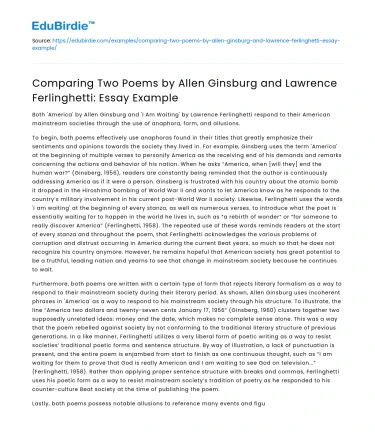Both 'America' by Allen Ginsburg and 'I Am Waiting' by Lawrence Ferlinghetti respond to their American mainstream societies through the use of anaphora, form, and allusions.
To begin, both poems effectively use anaphoras found in their titles that greatly emphasize their sentiments and opinions towards the society they lived in. For example, Ginsberg uses the term 'America' at the beginning of multiple verses to personify America as the receiving end of his demands and remarks concerning the actions and behavior of his nation. When he asks “America, when [will they] end the human war?” (Ginsberg, 1956), readers are constantly being reminded that the author is continuously addressing America as if it were a person. Ginsberg is frustrated with his country about the atomic bomb it dropped in the Hiroshima bombing of World War II and wants to let America know as he responds to the country’s military involvement in his current post-World War II society. Likewise, Ferlinghetti uses the words 'I am waiting' at the beginning of every stanza, as well as numerous verses. to introduce what the poet is essentially waiting for to happen in the world he lives in, such as “a rebirth of wonder” or “for someone to really discover America” (Ferlinghetti, 1958). The repeated use of these words reminds readers at the start of every stanza and throughout the poem, that Ferlinghetti acknowledges the various problems of corruption and distrust occurring in America during the current Beat years, so much so that he does not recognize his country anymore. However, he remains hopeful that American society has great potential to be a truthful, leading nation and yearns to see that change in mainstream society because he continues to wait.
Save your time!
We can take care of your essay
- Proper editing and formatting
- Free revision, title page, and bibliography
- Flexible prices and money-back guarantee
Furthermore, both poems are written with a certain type of form that rejects literary formalism as a way to respond to their mainstream society during their literary period. As shown, Allen Ginsburg uses incoherent phrases in 'America' as a way to respond to his mainstream society through his structure. To illustrate, the line “America two dollars and twenty-seven cents January 17, 1956” (Ginsberg, 1960) clusters together two supposedly unrelated ideas: money and the date, which makes no complete sense alone. This was a way that the poem rebelled against society by not conforming to the traditional literary structure of previous generations. In a like manner, Ferlinghetti utilizes a very liberal form of poetic writing as a way to resist societies’ traditional poetic forms and sentence structure. By way of illustration, a lack of punctuation is present, and the entire poem is enjambed from start to finish as one continuous thought, such as “I am waiting for them to prove that God is really American and I am waiting to see God on television...” (Ferlinghetti, 1958). Rather than applying proper sentence structure with breaks and commas, Ferlinghetti uses his poetic form as a way to resist mainstream society’s tradition of poetry as he responded to his counter-culture Beat society at the time of publishing the poem.
Lastly, both poems possess notable allusions to reference many events and figures to describe their sentiments toward their country as they respond to mainstream American culture. Uniquely, 'America' alludes to mainstream titles to provide a deeper meaning to its readers as he responds to how American society was run during the Beat period. What Ginsberg suggested by “America’s emotional life [being] run by Time Magazine” (Ginsberg, 1960) is that the country is really being operated by the media as opposed to a proper government. He responds to mainstream society by implying that the consequences of their naive reliability on the media will ultimately affect how elected representatives come into power and lead America into the future. Similarly, Lawrence Ferlinghetti expresses his view and credence on how the current society is being run by alluding to a widely accepted religious belief as he “[waits] for the Second Coming” (Ferlinghetti, 1958). Here, Ferlinghetti suggests that at this time society is in need of a righteous leader such as the return of Christ because society is so full of corruption and is in due of a spiritual cleanse.
To conclude, the use of repeating words at the beginning of stanzas for emphasis and personification, the creative use of the literary form of verses, and the reference to many expressive mainstream allusions enabled both Lawrence Ferlinghetti and Allen Ginsberg to respond to mainstream society through their poems.






 Stuck on your essay?
Stuck on your essay?

